The Black Room Blu-ray Movie
HomeThe Black Room Blu-ray Movie 
Eureka ClassicsEureka Entertainment | 1935 | 68 min | Not rated | No Release Date
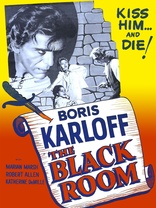
Price
Movie rating
6.9 | / 10 |
Blu-ray rating
| Users | 0.0 | |
| Reviewer | 3.5 | |
| Overall | 3.5 |
Overview
The Black Room (1935)
When Baron Frederick de Berghman learns that his wife has given birth to twin boys, he refuses to drink a toast to them. He tells his courtiers that there is a prophecy that the younger of the twins -in this case born one minute after the elder- will kill his older brother in the Black Room. As a protective measure, he seals off the room in the hope that the prophecy may not happen. Many years later, Baron Gregor de Berghman pleads with his twin brother Anton to return to the family castle. Anton arrives to find the populace in revolt and there is even an attempt on his life when they mistake him for the Baron. There is no doubt that the Baron is evil and eventually kills Anton in the Black Room and takes his identity. That does no mean the prophecy cannot, or will not, come true...
Starring: Boris Karloff, Marian Marsh, Robert Allen (I), Thurston Hall, Katherine DeMilleDirector: Roy William Neill
| Horror | Uncertain |
| Crime | Uncertain |
Specifications
Video
Video codec: MPEG-4 AVC
Video resolution: 1080p
Aspect ratio: 1.33:1
Original aspect ratio: 1.37:1
Audio
English: LPCM 2.0 Mono (48kHz, 24-bit)
Subtitles
English SDH
Discs
Blu-ray Disc
Single disc (1 BD)
Playback
Region B (A, C untested)
Review
Rating summary
| Movie | 3.5 | |
| Video | 3.5 | |
| Audio | 3.5 | |
| Extras | 2.0 | |
| Overall | 3.5 |
The Black Room Blu-ray Movie Review
Reviewed by Jeffrey Kauffman May 7, 2021 Note: This film is available on Blu-ray as a part of
Karloff at Columbia.
Boris Karloff has one of the more amazing filmographies in the annals of show business history, with the IMDb listing over 200 (!) acting credits for
the
venerable
performer. One of the kind of interesting if at times kind of weirdly unstated aspects of that success is the fact that Karloff managed his career in
at least some of the
1930s
and 1940s without the traditional “seven year contract” that was regularly doled by the major Hollywood studios in the Golden Age of filmmaking.
In
fact, many online biographies of Karloff don’t even mention any contracts, though the fact that a 1931 contract Karloff signed with
Universal
fetched over eleven thousand dollars in an auction is certainly more than enough evidence that (of course) some kind of contract was
signed
for various appearances. That said, Karloff at Columbia provides clear separate evidence that Karloff, unlike many other major
stars
of that same general period, was never officially tied down to one particular studio (many film fans almost automatically associate Karloff with
Universal during this period), at least for any extended period of time. The fact that Karloff was
also a guiding light behind the then nascent Screen Actors Guild may give credence to the hunch that Karloff was eerily prescient in being able to
see
that a studio’s contractual “hold” over a performer was something to be avoided, not chased, in an awareness that arguably came years before
such
heavyweights (and, notably, women) as Olivia de Havilland and Bette Davis started actual legal proceedings to chip away at the “seven year
indentured servitude” that
studios often required of their stars. Eureka Entertainment has now assembled six of Karloff's Columbia features made between 1935 and 1942
(the same period when Karloff was also appearing in films bearing the studio imprimaturs of everyone from Universal to Monogram to RKO) in an
appealing set that may not
include any outright masterpieces, but which show quite clearly just how versatile an actor Karloff was.
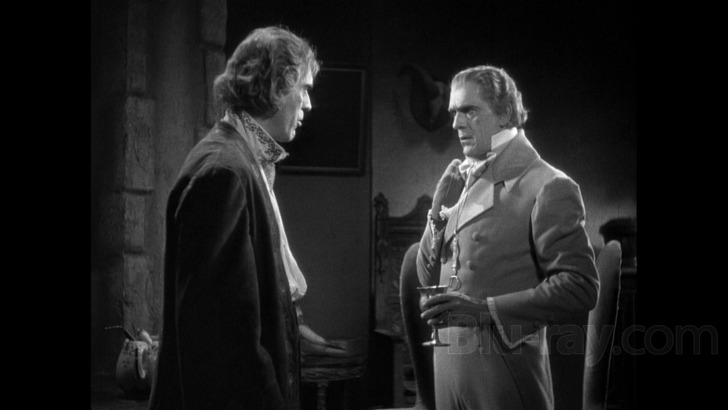
In a way, The Black Room makes it easy to see why Karloff might have wanted to take a break from Universal, since the actor was (according to the interesting commentary by Kevin Lyons and Jonathan Rigby) on record as stating this film finally gave him the opportunity to act. Karloff gets to portray two wildly different twin brothers, Gregor and Anton, who may be subject to a long foretold family curse that states that the younger brother (Anton) may kill the older brother (Gregor). Knowledge of this curse is overtly shown in a kind of prefatory scene which announces the births of the twins, and later it's disclosed the twins themselves have evidently been haunted by it for most of their lives, with Anton leaving his family home as a result. The main story picks up with Anton's return home after Gregor pleads that he needs help. Suffice it to say that when "evil twin" Gregor then claims Anton as one of his (many) victims, the prophecy would seem to have it backwards, though the film has a few sly surprises up its veritable sleeve. Karloff delivers two (and actually three, for reasons which will become clear to any viewers of the film) fun performances, and longtime Sherlock Holmes director Roy William Neill invests the proceedings with a good amount of Gothic style.
The Black Room Blu-ray Movie, Video Quality 
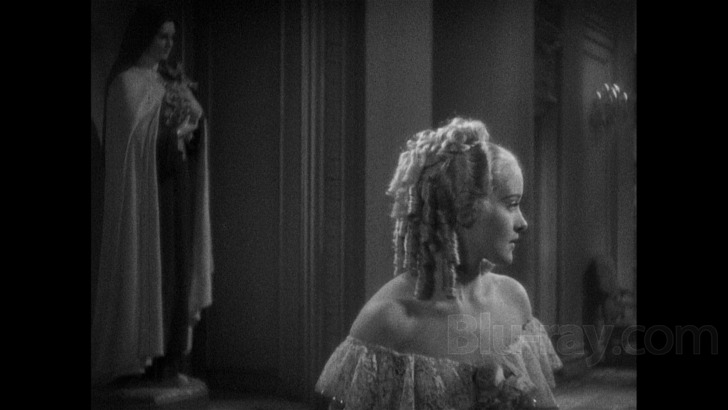
The Black Room is presented on Blu-ray courtesy of Eureka! Entertainment with an AVC encoded 1080p transfer in 1.33:1. Eureka only sent check discs for purposes of this review, and so I'm not privy to any information on the transfer that might be included in the insert booklet. This is often a quite striking looking presentation, though it almost looks like it may have been sourced from two elements. At its best, this has really nicely articulated contrast, with some impressive blacks, and with generally good fine detail levels, though the prevalence of dimly lit material may work against that aspect at times. In less impressive moments, the already pretty thick grainfield has a noticeable uptick in grittiness, and clarity also suffers a bit, with more of a general "dupey" look. Damage is rather minimal, all things considered.
The Black Room Blu-ray Movie, Audio Quality 
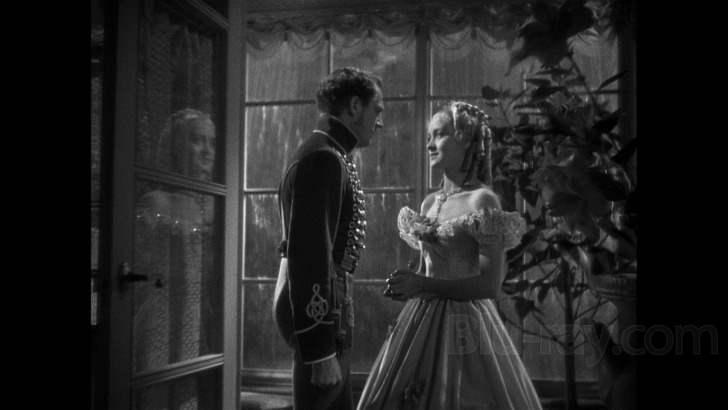
The Black Room features an LPCM 2.0 Mono that certainly shows the limited fidelity and dynamic range of that era's recording technologies, but which has not outright damage to speak of. Certain elements, like the cimbalom (or maybe hammered dulcimer, it's hard to tell due to the framings utilized) that is played in the local tavern, sound pretty bright and tinny, but another musical moment with love interest Thea (Marian Marsh) playing the harp and singing sounds reasonably full bodied and warm. Dialogue is rendered cleanly and clearly throughout. Optional English subtitles are available.
The Black Room Blu-ray Movie, Special Features and Extras 
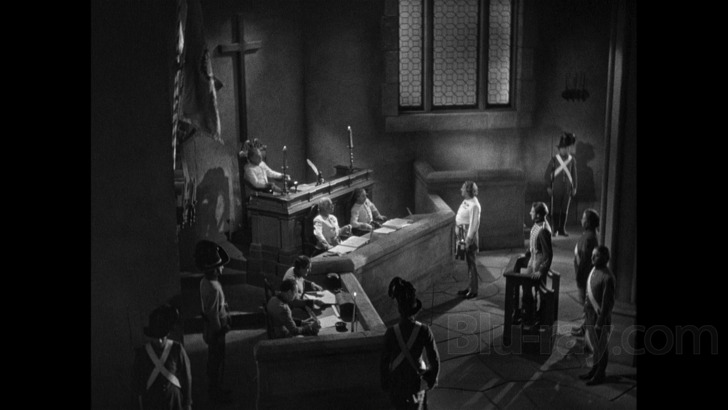
- Audio Commentary by Kevin Lyons and Jonathan Rigby
- Stills Gallery: Production Stills (HD)
- Stills Gallery: Artwork and Ephemera (HD)
The Black Room Blu-ray Movie, Overall Score and Recommendation 
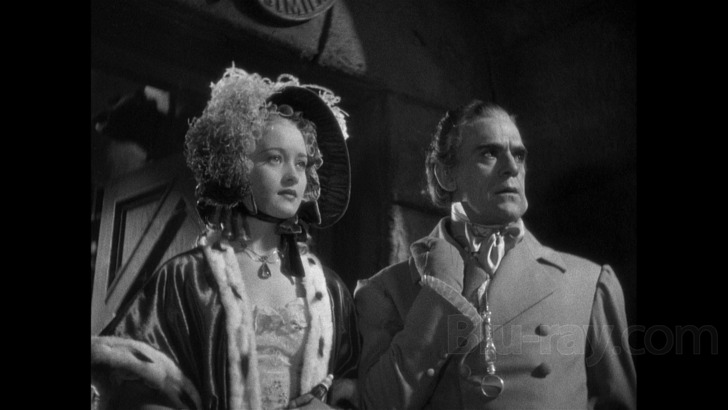
Because it's not part of the so-called "Mad Doctor Series" of Columbia films starring Karloff, The Black Room sometimes gets overlooked in Karloff's Columbia filmography, but in some ways it provides Karloff the clearest opportunity to show his performance chops of any of the Columbia outings in this set. Technical merits are a bit variable but generally solid, and the commentary and still galleries enjoyable. Recommended.
Similar titles
Similar titles you might also like
(Still not reliable for this title)

The Devil Commands
Eureka Classics
1941

Before I Hang
Eureka Classics
1940

The Man They Could Not Hang
Eureka Classics
1939

The Boogie Man Will Get You
Eureka Classics
1942

Incident in a Ghostland
2018

The Black Cat
The Vanishing Body / Masters of Cinema
1934

Doctor X
Warner Archive Collection
1932

Murders in the Rue Morgue
Masters of Cinema
1932

The Man with Nine Lives
Eureka Classics
1940

Horrors of the Black Museum
Cult Classics
1959

The Raven
Masters of Cinema
1935

Tales of Halloween
2015

Fright Night 2: New Blood
2013

The Old Dark House
Masters of Cinema
1932

The Devil Rides Out
Hammer
1968

The Void
2016

The Mystery of the Wax Museum
Premium Collection
1933

The Bride of Frankenstein 4K
90th Anniversary Limited Edition
1935

Demons of the Mind
Hammer
1971

Frankenstein
The Man Who Made a Monster
1931